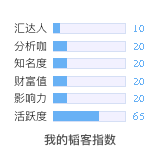Barron's上的文章
前几天的文章了,大家看看当看看。
TUESDAY, MAY 8, 2007
INVESTORS' SOAPBOX AM
Dollar Could Buck the Steady Slide
Prudential Equity Research
ACCORDING TO RUSSELL INDEXES, the total returns in dollar terms of both developed and emerging markets outside the U.S. have topped the U.S. through the first third of 2007 as well as over the past one, three and five years.
Part of the explanation for the outperformance of non-U.S. markets has been the steady decline of the dollar; if a market stays flat for the year but its currency gains 10% versus the dollar, a U.S. investor will see a 10% gain. U.S. investors in mutual funds have successfully timed this performance of both markets and currency, since flows to foreign funds have easily topped domestic funds over the past few years.
So far, this diversification looks like a free lunch, both boosting returns and reducing risk. Quants like us are deep believers in the benefits of diversification from a long-term perspective, but will the double-barreled gains of both markets and currency continue indefinitely? Might the dollar rebound at some point, and might the U.S. equity market eventually outperform?
Based on estimates for the current and next fiscal years, U.S. stocks look to be a multiple point or two higher than stocks in the United Kingdom, France, Germany and Italy. But analysts projected long-term growth rates are much higher for the U.S., about 12% versus about 7% for each of the continental European markets.
Not surprisingly, analysts expect fast profit growth for China, India and Brazil. But China sports a much higher price-to-earnings multiple than the U.S., and emerging markets in general have historically been much more volatile than the U.S. For investors with a long time horizon and true experts to guide them, allocations to emerging markets probably make sense. But given the big run that they have had, is it not possible that emerging markets might correct a bit, or at least lag the U.S.?
Despite the weak dollar over the past few years and a big increase in energy prices, U.S. inflation has remained fairly tame, as importers seem to have held the line on prices to defend share in the big U.S. market. Equity prices have risen for more than four years despite the weak dollar.
We suggest that the best way to interpret this result is to conclude that, historically, a weak dollar has hurt equities to the extent that the weak currency creates higher inflation. That is, absent a pickup in inflation, currency hasn't had much influence on U.S. stocks. Indeed, the weak dollar has clearly helped earnings (as usual), and it's not unreasonable, it seems to us, to conclude that in this cycle the weak dollar has been a small net plus for U.S. equity investors, at least viewed solely in dollar terms.
We have never pretended to be currency experts, but in addition to interest-rate differentials, over time currencies tend to follow fundamental patterns. The simplest way of measuring this over the years has been The Economist magazine's Big Mac index. That is, McDonald's has stores around the world that sell a similar product. Londoners are not going to fly to New York to save a few shillings on a hamburger, but they might do so (and based on anecdotal reports, frequently do so) to save money on jeans or jewelry; the burger is just a proxy.
By this index, the dollar is about 20% undervalued versus the pound and euro, though overvalued by about the same amount versus the yen and 50% overvalued versus the Chinese yuan. If purchasing power parity asserts itself over the next few years, we might expect the dollar to weaken further versus the yen and the yuan, but it might strengthen versus the pound and the euro.
Globally, the dollar's steady slide might end sometime in 2007, especially if we are correct that the relatively weak growth of the U.S. turns to relatively strong over the next several quarters.
We are increasing our 2007 Standard and Poor's 500 target to 1650 and introducing a 2008 target Of 1880. In light of the strong first-quarter earnings we are increasing our 2008 S&P 500 operating earnings-per-share forecast to $103 from $102 (keeping 2007 at $95 for now, above the bottom-up consensus).
If we are right about the market outlook and if the dollar stops falling, global investors might reverse the trades of the last few years, as non-U.S. investors increase U.S. allocations and U.S. investors bring their money home.










